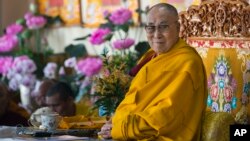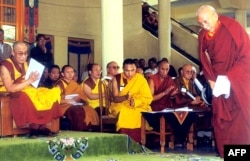The Dalai Lama says he has appointed emissaries to attend international engagements or speak on his behalf indefinitely.
Citing increasing physical fatigue, the exiled Tibetan spiritual leader made the comments while meeting with a group of international youth leaders brought to Dharmsala, India, by the Washington-based Institute of Peace.
“I'm 82 years old, and since last year [my] feeling of tiredness has been much increased,” he told the group during video-recorded meetings last week.
Because he may not be able to maintain a regular international travel schedule, he said, the president of Tibet's current government-in-exile, Lobsang Sangay, along with prominent Buddhist scholar and former prime minister in exile, Samdong Rinpoche, would act as his official emissaries.
These "trusted friends, they know my thinking," he said. “Our work, continuously, should be more active [and internationally engaged], so in these two persons," he said, pointing to Lobsang and Samdong, "I have full trust."
Looking to the dialogue moderator, USIP President Nancy Lindborg, the Dalai Lama said: "If your side ... or your government's side" has concerns, "then these two persons, either one, can participate as my representative or my personal emissary.”
Penpa Tsering, representative for the Office of Tibet in Washington, which represents the Tibetan government-in-exile, downplayed the significance of the Dalai Lama's statement.
"I think this was more of a general statement," he told VOA. "His holiness is sometimes too tired to travel, and his April visit to the United States has been suspended indefinitely, but he will continue to travel in India, and Europe is only a seven hour flight."
Adding that Lobsang's presidential term is limited to five years, and the fact that Samdong has long served as a kind of unofficial deputy to the Dalai Lama, he said the November 6 comments do not represent a major diversion or change in Dharmsala’s official representation on the world stage.
Symbol of Tibet
However, Carole McGranahan, a University of Colorado anthropologist and historian of Tibet, says although prioritizing the Dalai Lama's health requires a reduction in his international travel schedule, his physical absence from global engagements cannot be substituted via proxy.
"So much of the goodwill and attention Tibet receives in the world is due to his holiness, and specifically due to his personal interactions with world leaders and with the large audiences he draws around the world. His deep wisdom, his humor and charisma, his serious attention to pressing world issues, and, of course, his model of compassion and leadership, make a deep impression on people," she told VOA's Tibetan Service via email.
"For so much of the world, the Dalai Lama is the symbol of Tibet. Will his trusted emissaries be able to achieve the same effects? Of course not, as no one can truly stand in for the Dalai Lama," she wrote. "They will be able to represent him, but no one can embody the message of Tibet as he does. His holiness's stepping back from international travel will signal a new era of Tibetan diplomacy in the world."
Robert Barnett, director of the Modern Tibet Studies Program at Columbia University, says the decision may be a signal to Beijing.
"Of course, there's always the possibility that this move is intended as a post-19th Party Congress signal to Beijing of increased openness to a resumption of talks, or possibly even a response to a request from there," he said. "It certainly should make Zhang Yijiong happier," he added, referring to Communist Party’s Tibet working group chief, who told reporters on the sidelines of the party congress that international figures have no excuse for meeting with the Dalai Lama.
"Except ... it seems unlikely that warhorses of that type can ever be appeased," Barnett added, again referring to Zhang.
In the United States, a California-based Tibetan monk named Tenzin Dhonden, who chairs the non-profit Friends of the Dalai Lama and was secretary of the Dalai Lama Trust, a charitable organization chaired by the Dalai Lama, has acted as a gatekeeper between the Dalai Lama and American philanthropists, scholars, celebrities and donors.
Late last month, Dhonden, who falsely named himself Personal Emissary of Peace for the Dalai Lama in 2005, was suspended from the trust over corruption allegations.
This story originated in VOA's Tibetan Service. Pete Cobus contributed original reporting.










